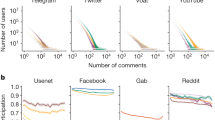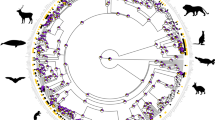Abstract
Recent studies have proposed that social norms play a key role in motivating human cooperation and in explaining the unique scale and cultural diversity of our prosociality. However, there have been few studies that directly link social norms to the form, development and variation in prosocial behaviour across societies. In a cross-cultural study of eight diverse societies, we provide evidence that (1) the prosocial behaviour of adults is predicted by what other members of their society judge to be the correct social norm, (2) the responsiveness of children to novel social norms develops similarly across societies and (3) societally variable prosocial behaviour develops concurrently with the responsiveness of children to norms in middle childhood. These data support the view that the development of prosocial behaviour is shaped by a psychology for responding to normative information, which itself develops universally across societies.
This is a preview of subscription content, access via your institution
Access options
Access Nature and 54 other Nature Portfolio journals
Get Nature+, our best-value online-access subscription
$29.99 / 30 days
cancel any time
Subscribe to this journal
Receive 12 digital issues and online access to articles
$119.00 per year
only $9.92 per issue
Buy this article
- Purchase on Springer Link
- Instant access to full article PDF
Prices may be subject to local taxes which are calculated during checkout




Similar content being viewed by others
Data Availability
All data supporting the findings of this study are provided in the Supplementary Code and data.
Code Availability
All code supporting the findings of this study are provided in the Supplementary Code and data.
References
Tomasello, M. Why We Cooperate (MIT Press, 2009).
Henrich, J. The Secret of Our Success: How Culture Is Driving Human Evolution, Domesticating Our Species, and Making Us Smarter (Princeton Univ. Press, 2015).
Henrich, J. et al. Markets, religion, community size, and the evolution of fairness and punishment. Science 327, 1480–1484 (2010).
Henrich, J. et al. Costly punishment across human societies. Science 312, 1767–1770 (2006).
Richerson, P. et al. Cultural group selection plays an essential role in explaining human cooperation: a sketch of the evidence. Behav. Brain Sci. 39, e30 (2016).
Chudek, M. & Henrich, J. Culture–gene coevolution, norm-psychology and the emergence of human prosociality. Trends Cogn. Sci. 15, 218–226 (2011).
Barrett, H. C. The Shape of Thought: How Mental Adaptations Evolve (Oxford Univ. Press, 2014).
Bicchieri, C. Norms in the Wild: How to Diagnose, Measure, and Change Social Norms (Oxford Univ. Press, 2016).
Keller, H. Cultures of Infancy (Psychology Press, 2013).
Rutland, A., Killen, M. & Abrams, D. A new social-cognitive developmental perspective on prejudice: the interplay between morality and group identity. Perspect. Psychol. Sci. 5, 279–291 (2010).
Tomasello, M. & Vaish, A. Origins of human cooperation and morality. Annu. Rev. Psychol. 64, 231–255 (2013).
Opp, K.-D. & Hechter, M. Social Norms (Russell Sage Foundation, 2001).
Bicchieri, C. The Grammar of Society: The Nature and Dynamics of Social Norms (Cambridge Univ. Press, 2006).
Smith, K. M., Larroucau, T., Mabulla, I. A. & Apicella, C. L. Hunter-gatherers maintain assortativity in cooperation despite high levels of residential change and mixing. Curr. Biol. 28, 3152–3157 (2018).
House, B. R. et al. Ontogeny of prosocial behavior across diverse societies. Proc. Natl Acad. Sci. USA 110, 14586–14591 (2013).
Rakoczy, H. & Schmidt, M. F. H. The early ontogeny of social norms. Child Dev. Perspect. 7, 17–21 (2013).
Schmidt, M. F. H., Rakoczy, H. & Tomasello, M. Young children enforce social norms selectively depending on the violator’s group affiliation. Cognition 124, 325–333 (2012).
House, B. R. & Tomasello, M. Modeling social norms increasingly influences costly sharing in middle childhood. J. Exp. Child Psychol. 171, 84–98 (2018).
McAuliffe, K., Raihani, N. J. & Dunham, Y. Children are sensitive to norms of giving. Cognition 167, 151–159 (2017).
Smetana, J. G. & Braeges, J. L. The development of toddlers’ moral and conventional judgments. Merrill-Palmer Q. 36, 329–346 (1990).
Blake, P. R. et al. The ontogeny of fairness in seven societies. Nature 528, 258–261 (2015).
Rochat, P. et al. Fairness in distributive justice by 3- and 5-year-olds across seven cultures. J. Cross Cult. Psychol. 40, 416–442 (2009).
House, B. R. Diverse ontogenies of reciprocal and prosocial behavior: cooperative development in Fiji and the United States. Dev. Sci. 20, e12466 (2017).
Cowell, J. M. et al. The development of generosity and moral cognition across five cultures. Dev. Sci. 20, e12403 (2017).
Engel, C. Dictator games: a meta study. Exp. Econ. 14, 583–610 (2011).
Fehr, E., Bernhard, H. & Rockenbach, B. Egalitarianism in young children. Nature 454, 1079–1083 (2008).
House, B. R., Henrich, J., Brosnan, S. F. & Silk, J. B. The ontogeny of human prosociality: behavioral experiments with children aged 3 to 8. Evol. Hum. Behav. 33, 291–308 (2012).
Robbins, J. & Rumsey, A. Introduction: cultural and linguistic anthropology and the opacity of other minds. Anthropol. Q. 81, 407–420 (2008).
Purzycki, B. G. et al. Moralistic gods, supernatural punishment and the expansion of human sociality. Nature 530, 327–330 (2016).
Leimgruber, K. L., Shaw, A., Santos, L. R. & Olson, K. R. Young children are more generous when others are aware of their actions. PLoS One 7, e48292 (2012).
Engelmann, J. M., Herrmann, E. & Tomasello, M. Five-year olds, but not chimpanzees, attempt to manage their reputations. PLoS One 7, e48433 (2012).
Engelmann, J. M. & Rapp, D. J. The influence of reputational concerns on children’s prosociality. Curr. Opin. Psychol. 20, 92–95 (2018).
Decety, J. & Svetlova, M. Putting together phylogenetic and ontogenetic perspectives on empathy. Dev. Cogn. Neurosci. 2, 1–24 (2012).
Paulus, M. The emergence of prosocial behavior: why do infants and toddlers help, comfort, and share? Child Dev. Perspect. 8, 77–81 (2014).
House, B. R., Henrich, J., Sarnecka, B. & Silk, J. B. The development of contingent reciprocity in children. Evol. Hum. Behav. 34, 86–93 (2013).
Sebastián-Enesco, C. & Warneken, F. The shadow of the future: 5-Year-olds, but not 3-year-olds, adjust their sharing in anticipation of reciprocation. J. Exp. Child Psychol. 129, 40–54 (2015).
Warneken, F. & Tomasello, M. The emergence of contingent reciprocity in young children. J. Exp. Child Psychol. 116, 338–350 (2013).
Olson, K. R. & Spelke, E. S. Foundations of cooperation in young children. Cognition 108, 222–231 (2008).
Over, H. The influence of group membership on young children’s prosocial behaviour. Curr. Opin. Psychol. 20, 17–20 (2018).
Hamlin, J. K. Moral judgment and action in preverbal infants and toddlers: evidence for an innate moral core. Curr. Dir. Psychol. Sci. 22, 186–193 (2013).
Hepach, R. & Warneken, F. Editorial overview: early development of prosocial behavior: revealing the foundation of human prosociality. Curr. Opin. Psychol. 20, iv–viii (2018).
House, B. R. How do social norms influence prosocial development? Curr. Opin. Psychol. 20, 87–91 (2018).
Kärtner, J. Beyond dichotomies—(m)others’ structuring and the development of toddlers’ prosocial behavior across cultures. Curr. Opin. Psychol. 20, 6–10 (2018).
Bauer, M., Cassar, A., Chytilová, J. & Henrich, J. War’s enduring effects on the development of egalitarian motivations and in-group biases. Psychol. Sci. 25, 47–57 (2014).
Henrich, J. & Boyd, R. The evolution of conformist transmission and the emergence of between-group differences. Evol. Hum. Behav. 19, 215–241 (1998).
McElreath, R. Statistical Rethinking (Chapman and Hall/CRC, 2015).
R Core Team. R: A Language and Environment for Statistical Computing (R Foundation for Statistical Computing, 2018).
Stan Development Team. RStan: The R Interface to Stan. http://mc-stan.org/ (2018).
Acknowledgements
We thank C. Ross for assistance with statistical methods, and the staff of the Institute of Human Origins at Arizona State University for support. This research was funded by a grant (grant no. 48952) from the John Templeton Foundation to the Institute of Human Origins, Arizona State University. The opinions expressed in this publication do not necessarily reflect the views of the John Templeton Foundation. This research was also funded by a Freigeist Fellowship from the Volkswagen Foundation to P.K. (grant no. 89611) and a SSHRC Doctoral Scholarship to S.L.-L. (award no. 752-2016-0555). The funders had no role in study design, data collection and analysis, decision to publish or preparation of the manuscript.
Author information
Authors and Affiliations
Contributions
B.R.H. and J.B.S. conceived the project and designed the study. P.K., H.C.B., T.B., A.E., S.L.-L., C.S.-E. and A.M.S. also contributed to study design. B.R.H., P.K., H.C.B., T.B., S.C., A.E., S.L.-L., C.S.-E., A.M.S., S.Y. and A.N.C. collected data. B.R.H. analysed the data. B.R.H. and J.B.S. wrote the manuscript and P.K. and H.C.B. also contributed substantially to writing. All of the authors contributed to writing the Supplementary Information.
Corresponding author
Ethics declarations
Competing interests
The authors declare no competing interests.
Additional information
Peer review information Primary Handling Editor: Stavroula Kousta.
Publisher’s note Springer Nature remains neutral with regard to jurisdictional claims in published maps and institutional affiliations.
Supplementary information
Supplementary Information
Supplementary Notes, Supplementary Methods, Supplementary Results, Supplementary Figs. 1–14 and Supplementary Tables 1–10.
Code and data
All datasets and R code for statistical analyses and figures.
Experimental Stimuli Videos
All video stimuli used across the different experimental conditions.
Rights and permissions
About this article
Cite this article
House, B.R., Kanngiesser, P., Barrett, H.C. et al. Universal norm psychology leads to societal diversity in prosocial behaviour and development. Nat Hum Behav 4, 36–44 (2020). https://doi.org/10.1038/s41562-019-0734-z
Received:
Accepted:
Published:
Issue Date:
DOI: https://doi.org/10.1038/s41562-019-0734-z
This article is cited by
-
Neural asymmetry in aligning with generous versus selfish descriptive norms in a charitable donation task
Scientific Reports (2024)
-
Hearing Prosocial Stories Increases Hadza Hunter-Gatherers’ Generosity in an Economic Game
Human Nature (2023)
-
Emotion detection in psychological texts by fine-tuning BERT using emotion–cause pair extraction
International Journal of Speech Technology (2022)
-
Understanding the social impacts of enforcement activities on illegal wildlife trade in China
Ambio (2022)
-
The effect of unavailable donation opportunities on donation choice
Marketing Letters (2022)



